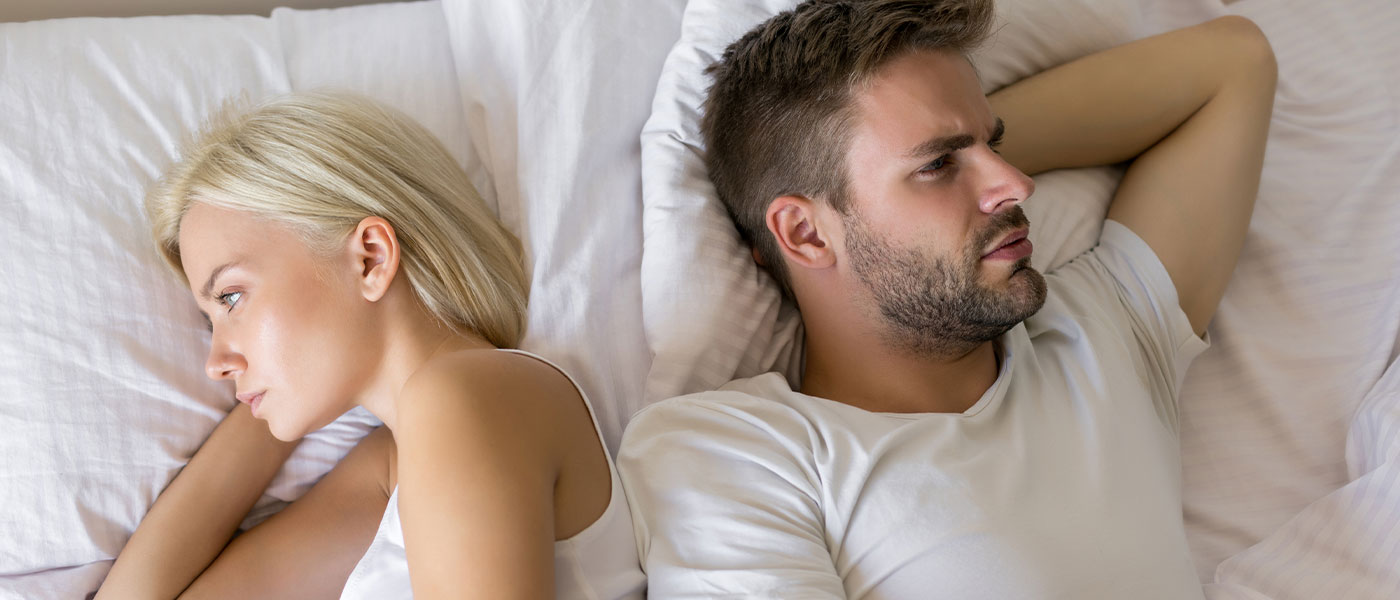
You’ve had another long, exhausting day, and despite feeling tired, you find yourself staring at the ceiling late into the night. Perhaps it’s stress keeping you awake or the glow of your phone disrupting your ability to wind down. The next morning, you wake up groggy and irritable. What you may not realize is how closely your sleep patterns are tied to your sexual health, including your ability to maintain a healthy sex drive and prevent conditions like erectile dysfunction (ED).
At Genesis Lifestyle Medicine, we understand the interconnectedness of sleep and sexual wellness. Sleep plays a pivotal role in regulating hormones, repairing the body, and supporting overall health. In this article, we explore how disrupted sleep patterns can lead to ED and impact sexual well-being and provide actionable tips to improve sleep and sexual health.
Hormonal imbalances
Sleep affects your sexual health by regulating hormone production. Testosterone, the hormone responsible for sexual desire and performance, is primarily produced during deep sleep. If you’re not getting enough quality sleep, your testosterone levels can drop significantly. Lower testosterone doesn’t just affect libido; it also impacts the ability to achieve and maintain an erection. Research shows that men who sleep less than 5 hours a night experience a reduction in testosterone levels, creating a cycle of diminished sexual function.

Sleep disorders
Sleep disorders, such as obstructive sleep apnea (OSA), are closely linked to ED. OSA interrupts your breathing during sleep, reducing oxygen levels and disrupting restorative sleep cycles. This lack of quality sleep can impair blood flow, which is essential for an erection. Studies have shown that up to 63% of men with sleep apnea also experience ED. Similarly, insomnia, which causes difficulty falling or staying asleep, can lead to chronic fatigue, increased stress, and hormonal imbalances, which negatively impact sexual performance.
Compromised blood flow
Healthy blood circulation is essential for sexual function, as erections depend on adequate blood flow to the penile tissues. Sleep deprivation can lead to cardiovascular problems such as high blood pressure and arterial stiffness, which reduce blood flow throughout the body, including to the genitals. Over time, chronic sleep loss increases your risk of developing heart disease, which is a contributing factor to ED. By addressing your sleep patterns, you can support your cardiovascular health and, in turn, improve your sexual well-being.

Psychological effects of poor sleep
Sleep deprivation doesn’t just affect your body; it also takes a toll on your mental health. Anxiety, depression, and irritability are common consequences of poor sleep, and these psychological factors can significantly impact your sexual health. Stress and anxiety about sexual performance can create a vicious cycle, making ED worse and further damaging self-confidence. Addressing your sleep patterns can help stabilize your mood, reduce anxiety, and improve your overall mental health, creating a more positive foundation for sexual activity.
Disrupted circadian rhythm
Your body’s internal clock, or circadian rhythm, regulates your sleep-wake cycles. When this rhythm is disrupted—due to shift work, jet lag, or irregular sleep schedules—your body’s ability to produce hormones and maintain energy levels is compromised. Circadian rhythm disruptions can affect your libido and erectile function by interfering with the timing of testosterone production and impairing your sense of well-being. Consistently maintaining a regular sleep schedule can help restore balance to your circadian rhythm and support better sexual health.

Tips to improve sleep patterns and sexual health:
- Prioritize consistent sleep schedules: Your body thrives on routine. Aim to go to bed and wake up at the same time every day, even on weekends. This consistency helps regulate your circadian rhythm and improves the quality of your sleep. Over time, you’ll notice increased energy levels, better hormonal balance, and improved sexual function.
- Create a sleep-friendly environment: Optimize your bedroom for restful sleep by minimizing light, noise, and distractions. Invest in blackout curtains, a comfortable mattress, and breathable bedding. Keep the room cool and avoid using electronic devices an hour before bed, as the blue light emitted can interfere with melatonin production.
- Limit caffeine and alcohol intake: Caffeine can stay in your system for up to 6 hours, disrupting your ability to fall asleep. Similarly, while alcohol may make you feel drowsy initially, it disrupts REM sleep, the restorative phase crucial for hormone production. Opt for herbal teas or water in the evening to promote better sleep.
- Manage stress: Stress is a sleep disruptor and can contribute to both insomnia and ED. Incorporate relaxation techniques such as deep breathing, meditation, or yoga into your daily routine. These practices can help calm your mind and prepare your body for restful sleep.
- Seek professional support: If you’re struggling with persistent sleep issues or ED, consulting a healthcare provider is essential. At Genesis Lifestyle Medicine, we offer various treatments tailored to address both sleep and sexual health concerns. From hormone therapy to lifestyle interventions, our expert team is here to help you achieve optimal well-being.
Your sleep patterns are vital to your overall health and sexual wellness. Disrupted sleep can lead to hormonal imbalances, poor blood flow, psychological stress, and an increased risk of erectile dysfunction. By taking steps to improve your sleep hygiene and seeking support when needed, you can enhance both your quality of life and your sexual health. Schedule a consultation at Genesis Lifestyle Medicine, we’re committed to helping you achieve your health goals—from better sleep to a more fulfilling sexual life.



